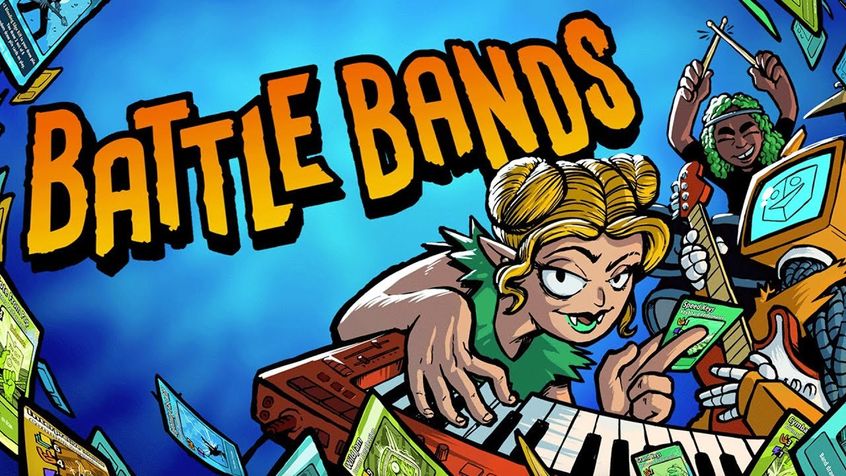Battlebands
In my Across the Obelisk review, I talked about deck builders, how they work, and what makes them tick. In that review, I looked also at the multiplayer element, and how much complexity and potential that adds to a game. I talked about how giving more options to build allows the player to enhance the variation in any given playthrough, and how variation lies at the heart of replayability and - I’d argue - fun. Battle Bands gives me an opportunity to revisit that theory, and the role multiplayer can play in a deck builder.
Oh lord, let us revisit it.
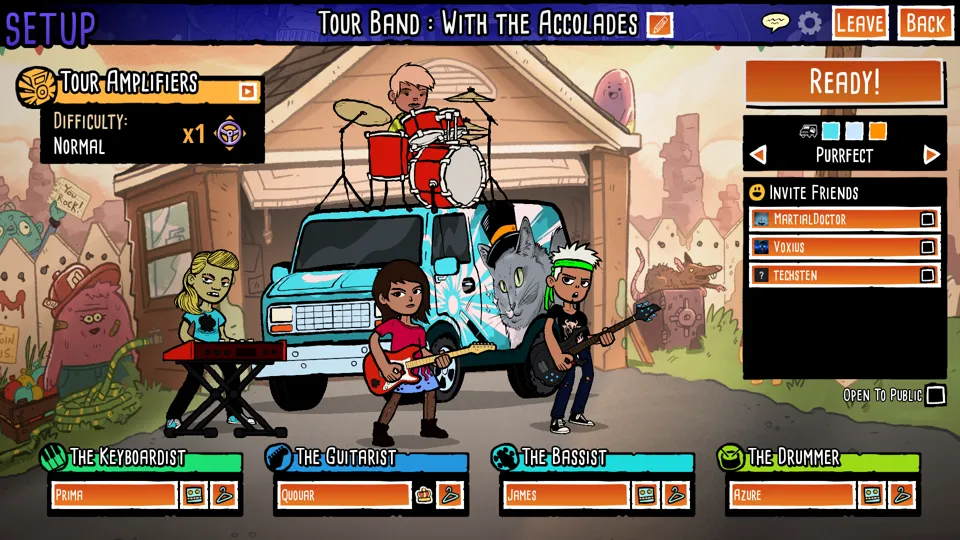 Yes, hello, we are a human band making human music.
Yes, hello, we are a human band making human music.
Battle Bands is a roguelike deck-builder. Instead of a fantasy theme or a Russian witchcraft theme or a tower conquest theme, Battle Bands has a rock band theme. It’s a perfectly good theme for a game, and one that definitely offers the opportunities I discussed in the Across the Obelisk review that are critical for any deck-builder. It, in theory, offers the opportunity for customisation, music, and a fun and unique adventure.
Like most deck-builders, you play as a little character, collecting and upgrading cards, and defeating enemies with the power of your fandom along the way. In each battle, your band has a specific hype goal it needs to reach. The first band to reach the hype goal wins. There are a variety of strategies to get there, from sabotaging the enemy, to spamming card draw, to just playing raw power, and, like any deck-builder, strategic addition and removal of cards is key.
In addition to your own character, you play as part of a band of four characters, each with their own decks, all trying to optimise in their own ways. Not to keep harping on it, but this is an approach to deck-builders that can be done very well, as we see in Across the Obelisk. Different decks, all built together, have a great opportunity to synergise and become something greater than the sum of their parts.
You may notice one key difference between Battle Bands and Across the Obelisk, however, one small thing that makes all the difference in the world. Rather than being able to control your bandmates, they are either controlled by another player, or they are controlled by an AI. An AI who really, fundamentally, does not understand how to play cards in a specific and strategic order.
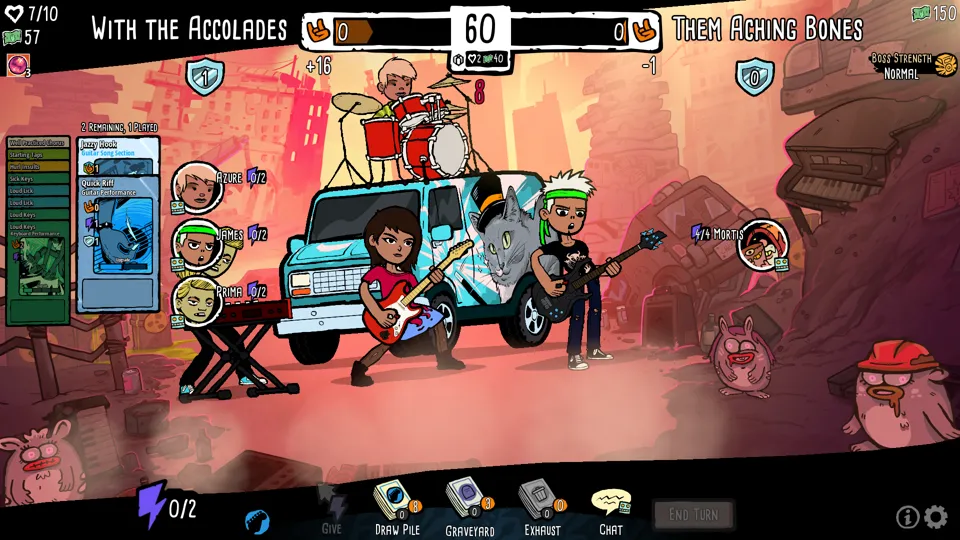 “Did you need me to play anything? …guys?”
“Did you need me to play anything? …guys?”
The idea, clearly, is that single player is not a mode the player is ever supposed to play. From the game’s loading screen, the player is consistently encouraged to “find a band,” or, if they do choose to play solo, open their game up publicly so others can join. I fully admit - I have never played multiplayer, nor do I have any particular desire to. When I tested it for this review, I found that, rather than a list of open lobbies, the game launches you into a random open spot in a random band with no real ability to choose who you play with. While this does ensure lobbies fill as quickly as possible, it potentially also builds an environment where the player is consistently stuck with a group they’d rather not be with. Removing the player choice in favour of speed also removes some of the player’s ability to control the experience they’d like to have, whether that be because a certain group doesn’t match their style, or because they feel actually unsafe with them.
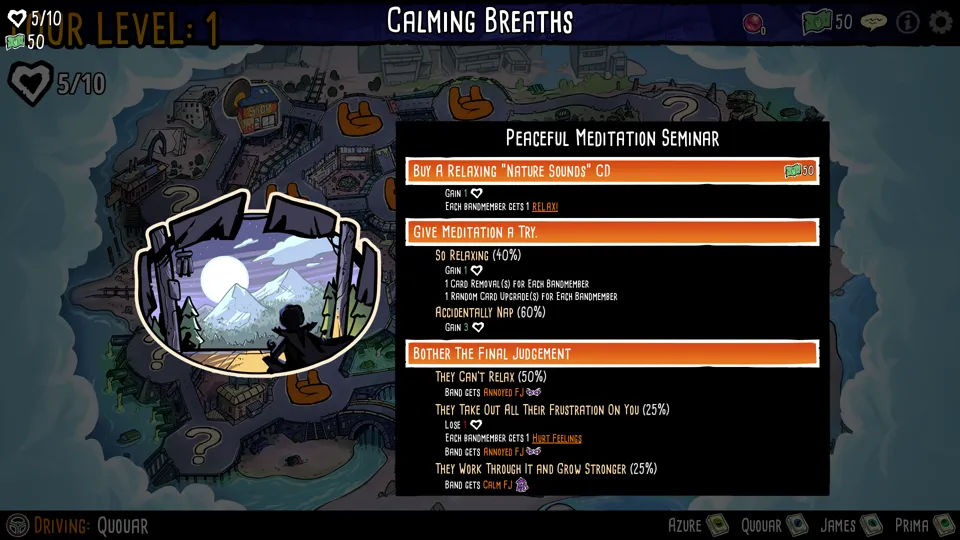 Bothering people is also unsafe.
Bothering people is also unsafe.
Setting aside the issues with multiplayer, it’s worth considering what impact the decision to focus on multiplayer has on this game. Though the game tries to usher the player into multiplayer, there is still a single player mode, playing with bots.
As previously mentioned, the bots are terrible at this game. It effectively ensures this game has no single player option.
To go off on a bit of a tangent, I have a friend who I play games with frequently. I get a bit frustrated with him sometimes, because of how long he takes to read cards or to make a decision about what action he wants to take. When he does make a decision, it’s usually a good one, and the thought is worth it, but in the moment that I’m waiting for him to read the card and puzzle through what he wants to do, I feel time tick by, oh so slowly.
When playing Battle Bands, I finally understand how my friend feels. I sit, reading my cards and trying to decide what to play. As I do so, a timer ticks down, and the bots have started playing without me, running through their entire hands, and then making a whistle noise to let me know I need to play a card. There is a push and a rush to take an action that has no place in a single player mode, no real chance to plan out strategy. Instead, there’s the frantic energy of trying to keep up with what nonsense bots are doing and how they’re wasting the communal pool of energy, and trying to find a way to stop them from playing terrible cards and blowing through what little energy the team has.
My character has two energy, but so, in a way, do I.
In addition to the game itself moving too quickly, there isn’t really a chance to review what happened. It’s a complaint I have about other games as well, but it’s especially acute with Battle Bands. Mousing over a card gives no information about what the various effects are, nor does mousing over a new card or effect give more information. Throughout, I feel like I’m making choices blind, and never really getting the chance to understand them because the game is playing itself.
I would chalk all this up to a game not being my thing, were it not for the shop. Battle Bands has a shop with in-game currency. That currency is used to buy cosmetics, but is obtained through grinding through the game, replaying the levels over and over and over. Or you could, I suppose, just buy the credits.
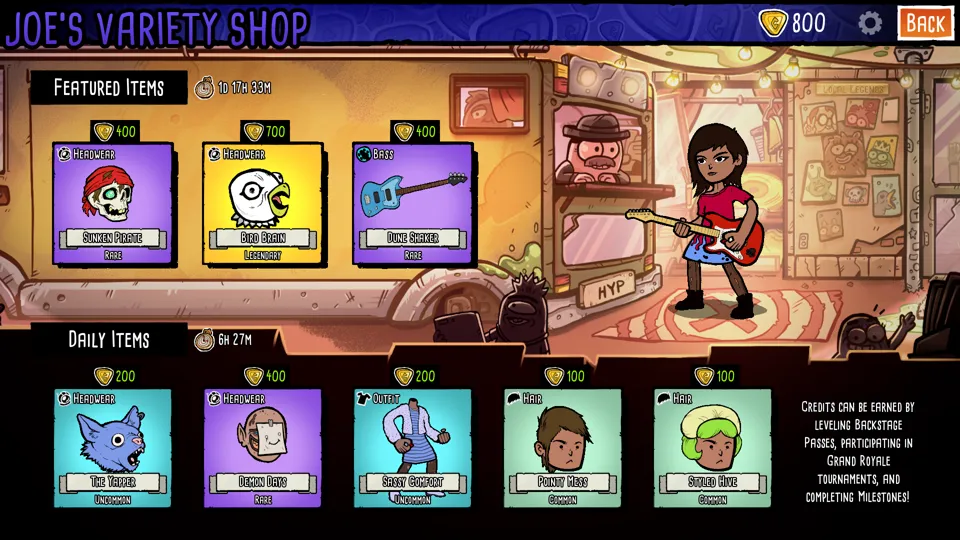 A screenshot from Battlebands
A screenshot from Battlebands
Making and maintaining a game are expensive, and Battle Bands is a game that is still very much in development. I understand the developer’s need to keep the lights on, and a shop provides the opportunity to do exactly that. It provides a bit of extra income to supplement whatever might be earned from actually selling the game.
This shop, however, follows the same predatory handbook of microtransactions as, say, Fortnite. By having items be available for a limited time in a shop, that shop creates a market of scarcity, even when the items are available to everyone. The consumer sees the item on a timer and feels more of an urgency to buy it, perhaps being willing to pay more, or - in the case of a game with purchasable tokens - forego the grind to get tokens in favour of buying some, then immediately spending them. It is a predatory way to run a game’s shop, and one that suggests the motive behind it isn’t the players as players, but rather, the players as a profit-engine.
Any one element of the game is forgivable. I could accept that the game isn’t particularly good as a single-player experience. I could accept that it’s a bit grindy. I could accept the shop. However, the combination of the three suggests a less-than savoury purpose to this game. By essentially requiring players to play multiplayer, the game requires friend groups to each buy their own copy. The grind requires that that group consistently play together, and in doing so, develops their taste for cosmetics, which they can then go spend additional money on in the shop. The mechanics feed into the shop, and indeed, feel intentionally worse out of a desire to milk as much money from the game as possible.
Being an indie dev isn’t cheap. I understand that. I also doubt the makers of this game are making money hand over fist. Likely, it makes enough to keep the lights on and fund their next project. However, other companies are able to do that without being predatory, without requiring four copies be sold for a game to be playable, and without sacrificing playability. It doesn’t seem unreasonable to expect the same of Battle Bands.
Developer: Aerie Digital
Genre: Deck-Builder, Roguelike
Year: 2022
Country: United States
Language: English
Play Time: 1-2 Hours/Run
